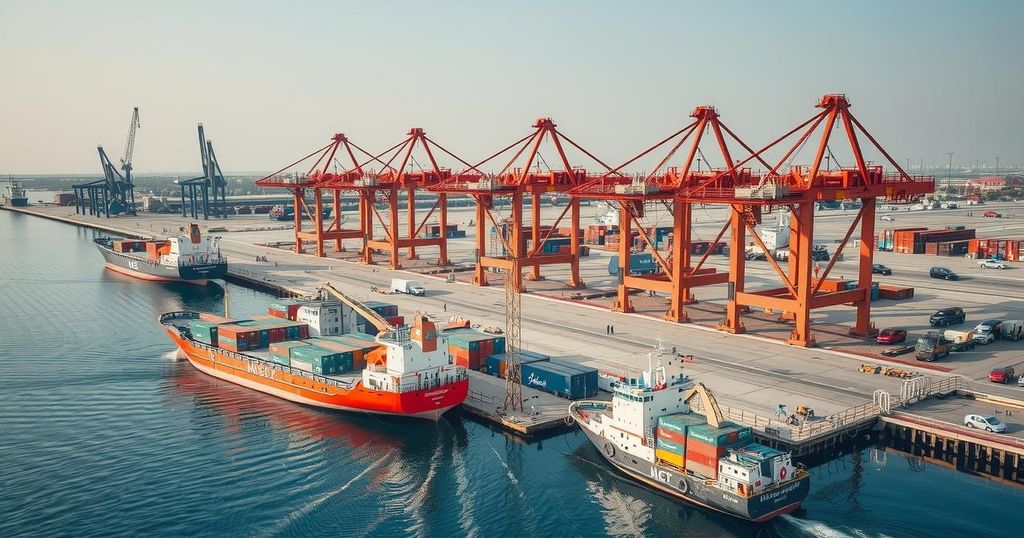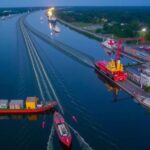Politics
AH, AHSAN IQBAL, ARABIAN SEA, ASIA, BALOCHISTAN, BEIJING, CHINA, CHINA OVERSEAS PORTS HOLDING, ENERGY, FAISAL, FOREIGN INVESTMENT, GWADAR, INFRASTRUCTURE DEVELOPMENT, IQBAL, MINISTRY OF MARITIME AFFAIRS, MUHAMMAD FAISAL, PAKISTAN, PAKISTANI MINISTER FOR PLANNING AND DEVELOPMENT, PLANNING AND DEVELOPMENT, S BELT AND ROAD INITIATIVE, SHAH, SHAHBAZ SHARIF, SHAHID KHAQAN ABBASI, SHARIF, SUPPLY CHAIN, SYDNEY, TRADE
Sophia Klein
Pakistan Faces Challenges in Revitalizing Gwadar Port’s Commercial Viability
Pakistan is struggling to commercialize the Gwadar Port, facing challenges stemming from local insecurity and a lack of operational planning. Despite being a key element of the China-Pakistan Economic Corridor, the port has handled less than 1% of national seaborne trade, prompting government calls for strategic planning to stimulate its growth.
Pakistan is facing significant challenges in attracting commercial activity to the Gwadar Port, a deep-sea facility financed by China. Experts attribute these difficulties to ongoing local insecurity, insufficient basic services, and a lack of strategic operational plans for the port’s development. A press release highlighted that authority figures have expressed a need for immediate planning initiatives to unlock the port’s potential, nearly a decade after its initial operation.
Minister for Planning and Development Ahsan Iqbal stated that there is currently no effective strategy in place to stimulate commercial trade at Gwadar Port, which has only accounted for under 1% of Pakistan’s total seaborne trade during the fiscal year 2022-23. Although Gwadar is promoted as a key asset in the China-Pakistan Economic Corridor, more than $1 billion in infrastructure enhancements surrounding the city have not translated into increased operational success.
Prime Minister Shahbaz Sharif has called for an increase in public sector trade through this port, suggesting at least 60% of imports and exports make use of Gwadar; however, former Prime Minister Shahid Khaqan Abbasi argues that the port lacks necessary infrastructure and human resources to support large-scale cargo operations effectively.
While the Chinese firm operating the port has plans to expand its capacity, building up to 100 berths by 2045, the current operations remain stunted due to the region’s instability, highlighted by escalated violence and an ongoing separatist insurgency in Balochistan province. The recently constructed New Gwadar International Airport, which aims to complement port operations, remains largely unutilized due to inadequate basic services and insecurity.
Despite these obstacles, some experts, including Mustafa Hyder Sayed from the Pakistan-China Institute, suggest that slow business activity in Gwadar does not necessarily jeopardize long-term bilateral relations between Pakistan and China, which are built on strategic interests rather than fleeting economic activities.
The Gwadar Port project is a central element of China’s Belt and Road Initiative, envisioned as a pivotal trade hub linking China to the Middle East and Central Asia. Since its completion in 2007 and operational handover to a Chinese company in 2013, the port has not realized its expected commercial potential due in part to local instability and a lack of infrastructure. Various governmental efforts sought to reenergize trade flow through the port, yet effective strategies and marketing remain unestablished, leading to criticism from political figures and experts alike.
In summary, the Gwadar Port’s struggle to attract trade reflects broader issues within Pakistan’s governance and planning frameworks. Despite significant investment and potential, the port has been unable to capitalize on its strategic location due to insecurity and infrastructural inadequacies. Ongoing attempts by the Pakistani government to revitalize this project will require coherent and focused planning, coupled with substantial investment, in order to transform Gwadar into a functional commercial hub.
Original Source: www.voanews.com








Post Comment